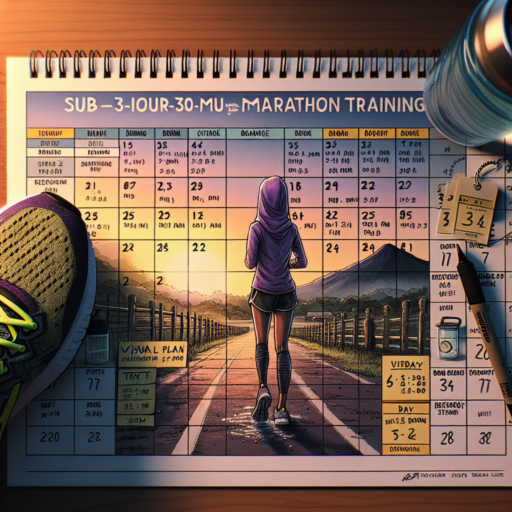No se han encontrado productos.
How fast to run a sub-2 hour half marathon?
Achieving a sub-2 hour half marathon is a notable goal for many runners, blending both speed and endurance. To clock in under two hours, the pace you need to maintain is crucial. This task requires not just physical readiness but also a strategic approach to pacing and training. Understanding the specifics of your pace can guide your training regime effectively towards this ambitious target.
To complete the 13.1 miles (21.1 kilometers) of a half marathon in less than two hours, runners need to maintain an average pace of approximately 9:09 minutes per mile (or 5:41 minutes per kilometer). This pace is fast enough to challenge a wide range of runners, from beginners aiming high to seasoned athletes looking for a new benchmark. It’s essential to integrate pace-specific sessions into your training, focusing sharply on consistency and endurance at your target pace.
Frequent, targeted training at or near your goal pace is key. Incorporating interval training, tempo runs, and long, steady distance runs into your regimen can dramatically improve your capability to hold the desired pace throughout the race. Focusing on your running economy, which includes optimizing your running form and efficiency, can also significantly contribute to achieving a sub-2 hour finish. Lastly, remember the importance of proper nutrition and hydration strategies, which play a vital role in sustaining your pace on race day.
How to run a half marathon in 2 hours and 15 minutes?
Achieving a half marathon in 2 hours and 15 minutes is a formidable goal that requires not just inherent speed but also a strategic training approach, proper nutrition, and the right mindset. While this target pace of approximately 10:18 per mile might sound daunting, with the right guidance and dedication, it’s entirely attainable. Here, we delve into some crucial strategies to help runners reach this milestone.
Strategize Your Training Plan
First and foremost, a structured training plan tailored to your current fitness level is essential. Incorporating interval training, long runs, and tempo runs into your weekly routine will improve your aerobic capacity, speed, and endurance. Start by gradually increasing your mileage and intensity, focusing on quality over quantity to prevent burnout and injuries.
Nutrition and Hydration
Optimizing your nutrition and hydration is key to fueling correctly for this endeavor. Focus on a balanced diet rich in carbohydrates, proteins, and healthy fats to support your training regimen. Additionally, proper hydration before, during, and after your runs ensures optimal performance and recovery.
By attentively following these guidelines and maintaining a consistent training and nutritional plan, the goal of completing a half marathon in 2 hours and 15 minutes becomes not just a dream but an attainable reality. Dedication and discipline are your true allies on this journey.
What is the average time for a half marathon for a woman?
Understanding the average time it takes for a woman to complete a half marathon can provide valuable insight for athletes and enthusiasts alike. This metric is influenced by a variety of factors, including age, training intensity, and experience. On average, women typically finish a half marathon in a time frame that ranges from 2 hours to 2 hours and 30 minutes.
Impact of Age and Training on Times
Age plays a significant role in determining the average finish time for a half marathon among women. Younger runners, often benefitting from higher metabolic rates and overall physical resilience, may lean towards the faster end of the average spectrum. Conversely, older runners may find their times to be closer to or slightly above the 2 hours and 30 minutes mark, though this greatly varies by training intensity and personal health. Rigorous and consistent training can significantly reduce half marathon times, showcasing the importance of a tailored and sustained training regimen.
Comparing to Global Averages
When analyzing global half marathon times, it’s noteworthy that average finish times can vary by region, largely due to climate, elevation, and the popularity of long-distance running in the area. Nonetheless, the worldwide average time for women completing a half marathon gravitates around the 2-hour mark, highlighting the universal appeal and achievable nature of this endurance event. This benchmark serves as a motivational goal for many female runners aiming to gauge their progress or set new personal records.
How to improve half marathon time?
Improving your half marathon time requires a focused approach, blending strategy, training, and nutrition to shave off seconds or even minutes. Whether you’re a seasoned runner looking to hit a new personal record or a relative newcomer to the distance, the following strategies can help you upgrade your performance effectively.
Optimize Your Training Plan
First and foremost, structuring your training plan with intention is crucial. This means incorporating a mix of long runs, speed work, and recovery days to ensure you’re building endurance while also increasing your speed. Consider tailoring your plan with periodization, dividing your training into phases that focus on building base mileage, speed and stamina, and tapering. Utilizing these phases allows your body to gradually adapt to increased demands, minimizing the risk of injury and burnout.
Nail Your Nutrition and Hydration
Nutrition and hydration play pivotal roles in your training and race day performance. Focus on a balanced diet rich in carbohydrates, lean proteins, and healthy fats to fuel your training sessions. Hydration, too, cannot be overstressed, particularly in the weeks leading up to and on race day. Experimenting with nutritional strategies during training runs helps identify what works best for your body, ensuring you can maintain optimal energy levels throughout the race.
Embrace Mental Preparation
Lastly, the mental aspect of running a half marathon can’t be overlooked. Visualization techniques, setting realistic goals, and positive self-talk can all contribute to a stronger mindset on race day. Approaching your training and the race itself with a positive, can-do attitude can be just as important as the physical training. Mental resilience will help you push through tough sections of the race and keep you moving towards your goal time.




